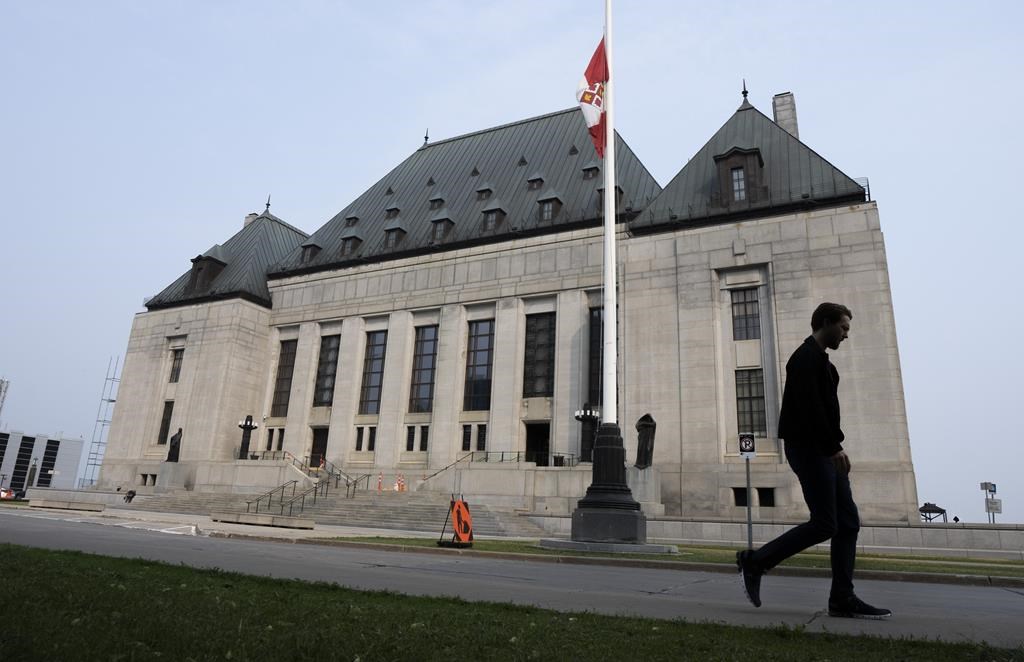Supreme Court will hear Quebec’s appeal of decision it shorted Innu on police funding

Quebec will be allowed to introduce new evidence to argue against a lower court’s decision that the province, along with the federal government, has failed in its constitutional obligation to act honourably in fulfilling a tripartite agreement for police services on a First Nation.
October 5 the Supreme Court of Canada granted Quebec’s application to appeal the decision in Attorney General of Quebec v. Pekuakamiulnuatsh Takuhikan – and – Attorney General of Canada, which was rendered by the Court of Appeal of Quebec in a Dec. 15, 2022 decision and rectified on July 3, 2023.
PekuakamiulnuatshTakuhikan is a political and administrative arm that represents nine Innu nations, including Pekuakamiulnuatsh First Nation, whose 9,552 members primarily live in the community of Mashteuiatsh.
Advertisement
Pekuakamiulnuatsh Takuhikan brought legal action against Canada and Quebec claiming the governments owed $1.6 million to cover a shortfall in funding that was experienced by the First Nation between 2013 and 2017 by its police services in Mashteuiatsh.
The governments continued to renew the tripartite agreements without increasing the funding. Because of this, Pekuakamiulnuatsh Takuhikan had to undertake catch-up wage increases retroactively for its police force members due to a salary arbitration award.
Pekuakamiulnuatsh Takuhikan alleged that Quebec and Canada had breached their obligations to negotiate in good faith, to act with honour and to fulfill their fiduciary duties toward it with respect to the funding of its police force.
The Quebec Superior Court dismissed the application in 2019.
However, the Quebec Court of Appeal found in favour of Pekuakamiulnuatsh Takuhikan, ordering Canada and Quebec to pay, respectively, $832,724.37 and $767,745.58, the total amount of the accumulated deficit.
Advertisement
Canada said it would not appeal the decision.
However, in February, Quebec announced its intention to challenge the Court of Appeal’s decision.
Quebec’s decision was slammed by both the Pekuakamiulnuatsh First Nation and the Assembly of First Nations Quebec-Labrador (AFNQL).
“The province continues to act dishonourably when it comes to First Nations public safety by not acknowledging its wrongdoing. Meanwhile, the chronic underfunding of all Indigenous police services continues,” said Pekuakamiulnuatsh First Nation Chief Gilbert Dominique in a statement.
“Why shouldn’t First Nations police services receive a level of funding that allows them to offer the same quality of services as those provided to non-Indigenous people?” said Ghislain Picard, Chief of the AFNQL.
Advertisement
At issue is whether the Court of Appeal erred in ruling that the honour of the Crown was engaged when the governments of Quebec and Canada entered into a contractual agreement with the Pekuakamiulnuatsh Takuhikan to fund an Indigenous police force for the Pekuakamiulnuatsh First Nation in Mashteuiatsh.
And if the Court of Appeal did err in that decision, then did it also err by giving precedence to the constitutional principle of honour of the Crown over the principles of Quebec civil law relating to contracts?
According to the tripartite agreement, First Nations police services are to be funded “at a level comparable to that of surrounding communities characterized by similar conditions.”
The First Nations Policing Policy states that it is up to the First Nation to top-up dollars to the required amount. However, Pekuakamiulnuatsh Takuhikan argued that any “discretionary” funding it had available was committed to other priorities.
Justice Jean Bouchard, one of the judges on the panel for the Quebec Court of Appeal, said the Nation “deserves deference” to establish how its own funds are to be spent “in the name of the objective of reconciliation between Indigenous and non-Indigenous peoples.”
Advertisement
In his decision, Bouchard noted that “the Supreme Court has not had to rule on a case involving a fiduciary duty in the context of actions of the Crown linked to Aboriginal interests other than land.”
However, he wrote, “The First Nations Policing Policy clearly states that it is a means of implementing the inherent right of Indigenous peoples to self-government so that they can benefit from professional policing services, effective, adapted to their cultures? The honour of the Crown is clearly at stake here.”
Dominique says they are confident the Supreme Court will uphold the Court of Appeal’s decision.
Picard also believes the Supreme Court’s ruling will be favourable.
He also points out that the Supreme Court’s decision to hear Quebec’s appeal comes only one day after the Quebec ombudsman released his first update on the 2019 Viens Commission report which listed 142 recommendations, including addressing the need to recognize Indigenous police services as autonomous bodies and essential services.
Advertisement
“Meanwhile, our police services continue to endure systemic discrimination and underfunding even though it is now a well-know issue,” said Picard.
At the same time that Pekuakamiulnuatsh Takuhikan undertook legal action, the Pekuakamiulnuatsh Nation also filed a complaint in 2016 with the Canadian Human Rights Tribunal (CHRT) against Canada.
On Jan. 31, 2022, the CHRT delivered its decision upholding Pekuakamiulnuatsh Takuhikan’s claim that insufficient funding to the Mashteuiatsh Police Services resulted in a deficient level of police services to the members.